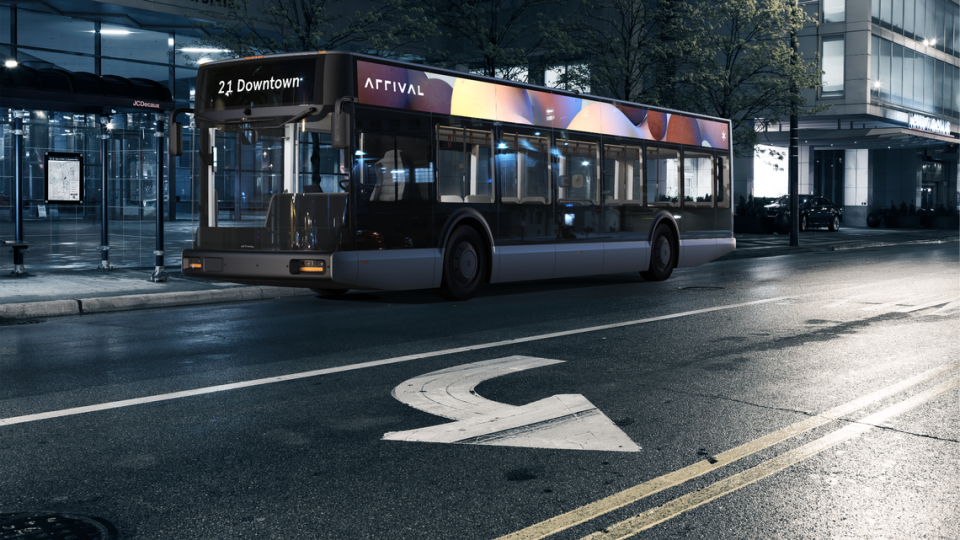Arrival, based in London, makes electric vehicles and vans, and recently announced a third manufacturing facility in Charlotte.
Courtesy of the city of Charlotte
Electric buses and vans can do more to quickly reduce greenhouse gas emissions in cities than upscale electric cars and SUVs, the CEO of a company that will make those electric utility vehicles in the Carolinas said Tuesday.
In late 2020, London-based electric vehicle manufacturer Arrival located its American headquarters in Charlotte. Arrival focuses solely on commercial vehicles unlike other electric vehicle manufacturers like VinFast, which announced Tuesday that it plans to build a massive factory in Chatham County.
During a panel discussion at the UNC Clean Tech Summit, Arrival CEO Mike Ableson said there are both business and environmental reasons for the company’s approach.
“If you want to have the greatest impact on emissions, convert the vehicles that are being used all day, every day in downtown, densely populated urban centers. Convert those vehicles to zero emissions,” Ableson said.
“I don’t know that the world needs more luxury car electric manufacturers right now,” he continued. “We think there’s a real opportunity with commercial.”
The U.S. Environmental Protection Agency reported that in 2019, light-duty trucks were responsible for 15.5% of the emissions from the country’s transportation sectors, while buses were responsible for 1.1% of transportation missions.
In addition to the headquarters, Arrival has located a van assembly microfactory and a battery assembly plant in Charlotte, with a bus assembly microfactory in nearby Rock Hill, South Carolina.
Abelson said the van microfactory is set to open in the fourth quarter of 2022., with the bus microfactory likely “a little further out.”
Arrival sets up its microfactories in existing 200,000- to 300,000-square-foot warehouses, then uses robots to assemble vehicles instead of relying on the more traditional vehicle assembly.
“We don’t have to go out and get an enormous piece of land which almost by definition has to be far from city centers,” said Ableson, who spent more than 30 years at General Motors.
Ableson later added that the microfactory approach could offer economic benefits to many communities instead of the “winner-takes-all proposition” of concentrating economic benefits in one location chosen for one large manufacturing facility.
“The manufacturer will site one huge factory, and one community somewhere in the nation gets the benefit of that,” Ableson said. “(With) the microfactory approach, we see many microfactories and we see a much more even and equitable distribution of the benefits of manufacturing.”
Arrival also says its microfactories allow it to turn a profit at lower levels of sales and reduce the environmental impact of manufacturing, particularly in terms of shipping finished vehicles to buyers.
Global shipping company UPS ordered 10,000 electric delivery vans from Arrival in April 2020 and is an investor in the company. In 2020, Arrival and the City of Charlotte signed a memorandum of understanding in which Arrival agreed to help Charlotte meet its goal of developing a 100% zero-carbon city fleet by 2030 and “investigate strategies and pilot programs” that could help.
“We really see buses as a way to not just address climate change and emissions but also to address congestion and many of the other issues that cities are working towards,” Ableson said.
Concerns about congestion are also referenced in Gov. Roy Cooper’s Executive Order 246, which directs the N.C. Department of Transportation to explore how to reduce vehicle miles traveled as part of the Clean Transportation Plan. That plan is intended to decrease greenhouse gas emissions from the state’s transportation sector.
In concert with Uber, Arrival has also designed a passenger vehicle meant for the use of ride-sharing companies and taxis.
The thermoplastic composite material that Arrival is using to make the bodies of its vehicles doesn’t need to be painted, said Suzanna Merkelson, the company’s director of public policy and public affairs. That eliminates the need for a paint shop as part of the manufacturing process and cuts down on emissions.
In response to a question about why vehicle adoption in Florida is far outpacing other Southeastern states, Merkelson took aim at a law that North Carolina and many other states have on the books preventing vehicle manufacturers from selling and servicing cars without a dealership network.
“If you don’t allow manufacturers to be able to sell the vehicles that they’re making in your state, it’s going to make it a lot harder for that adoption to occur. … Reconsidering that law would be a great way for North Carolina to be more competitive,” Merkelson said.
The News & Observer previously reported that Rivian executives expressed concern about the law in emails with state economic development officials. Rivian, an electric vehicle manufacturer, ultimately selected Georgia for its $5 billion manufacturing facility. Georgia is considering a law that would allow Rivian and other manufacturers to offer direct sales.
This story was produced with financial support from 1Earth Fund, in partnership with Journalism Funding Partners, as part of an independent journalism fellowship program. The N&O maintains full editorial control of the work.



